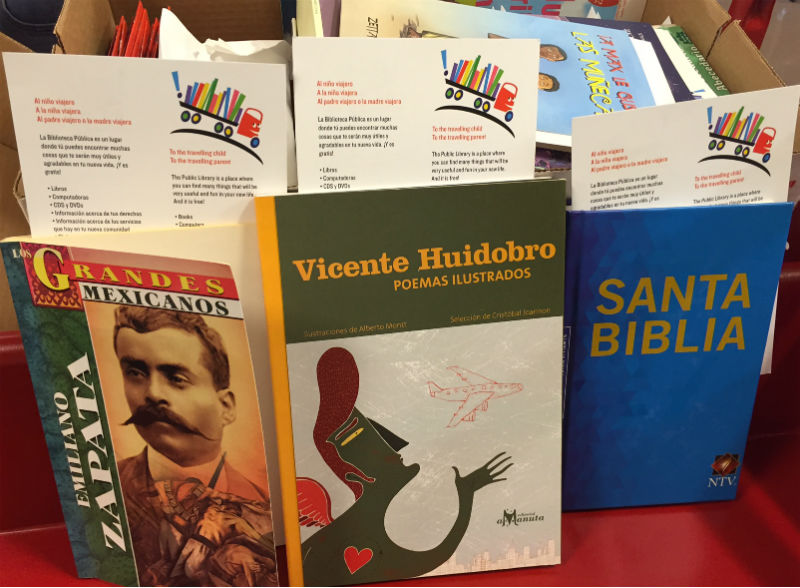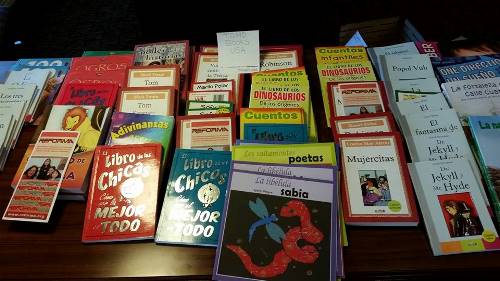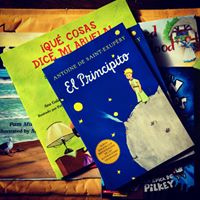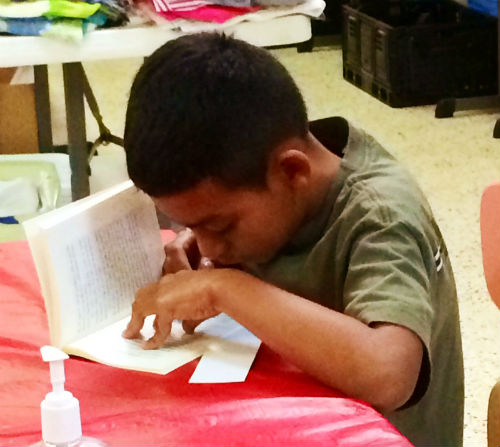REFORMA Leads Efforts To Get Books to Migrant Children
Donation drives pop up across the country to give children separated from their parents a book of their own, as REFORMA continues its efforts and builds relationships to support the migrant youth.
Multiple times a year, migrant children living in a shelter arrive at a nearby branch of the San Diego Public Library for a tour. They are shy, clearly accustomed to routine and structure, and always appreciative. At these outings organized by REFORMA, The National Association to Promote Library and Information Services to Latinos and the Spanish-Speaking, the new arrivals to America learn about public library resources and technology and take part in an activity. As time passes, they begin to open up. Branch manager Adriana Huertas hears about where they came from and some details of their past.
"I’m always amazed at the resiliency of these youth," she says. "When they start opening up and sharing their stories, even just a little bit, the fact that they can still smile and be engaged, interact, trust adults, trust other youth, is just amazing. When they share pieces [of their lives] here and there...I don’t think we realize what they have gone through."
At one point during each tour of the library, Huertas talks with the children about their aspirations and life dreams. They often want a job that will give back to the community and help others, she says. But when a recent group came through, a nine-year-old boy told her that his dream was to see his mom again. She was in Los Angeles, he said, and he really wanted to be with her again. Was Los Angeles far, he asked Huertas? Did she think he would see his mom soon?

Photo courtesy of REFORMA
CONTINUED EFFORTS BY REFORMA
While the public may have only recently focused on the plight of migrant children, REFORMA has been supporting the youth refugee community for years, leveraging their chapters across the country and creating relationships with the organizations that run the shelters and detention centers, as well as lawyers who help the kids and families. It is all in an effort to reach the children, to get them books, let them know people are here to help and about public libraries and their resources.
In 2014's an influx of unaccompanied minors into the United States, REFORMA members expressed outrage at how the children were being treated and a desire to do something. Oralia Garza de Córtes suggested the organization put together backpacks with books and school supplies to give to the kids. At that time, the REFORMA Children in Crisis Task Force was established and Garza de Córtes and Patrick Sullivan became the co-chairs. Their efforts have continued ever since, getting books to these children however they can.
“We’ve been working to get books into the hands of kids whether in border control custody, which is brief, or detention centers, which is nearly impossible—ICE doesn’t accept donations,” says Sullivan. “So we’ve been donating primarily to the shelters.”
They donate books to Catholic Charities, where unaccompanied minors often stop before heading for their destination, and legal offices that help immigrant kids and their families, too.
But they are also trying to create relationships and foster a partnership with public libraries. In Southern California, Sullivan worked with a shelter and convinced them to bring the kids to the nearby San Diego Public Library branch for a tour, to use the resources, and to receive a book. That book comes with a "This Book Belongs To" bookplate in the front to sign their name and, in the back, is a promotional library card.
“We’re trying to make a connection, rather than just shipping the books directly to the shelters and it’s like magic, they just show up,” says Sullivan. “From the beginning, we’ve tried to integrate the REFORMA chapters to make connections with the shelters so if they’re going to be taking the kids out, they know that there are librarians—they know that there are people that exist that are willing to help them get books and help them with their educational programs, homework helpers, whatever it may be.”
It took time and perseverance but Huertas gave her first tour in the summer of 2014 and she now conducts them four times during the summer and twice in the fall or winter. For Huertas, the tours give her a chance to meet these children, who she says separate themselves from typical school tour with their gratitude.
"Any small gesture is a big gesture for them," she says. "I can’t tell you how many times they come up to me, thank me, shake my hand, hug me. Almost every single youth says, 'God bless you.'"
At the end of the visit, the books—mostly in Spanish, though some are in English and indigenous languages—are set up for kids to choose from. She typically sees kids ages 12 to 17 from the shelter and the most requested book is the Bible. Beyond that, they look for biographies or history and, of course, the typical teenage topics such as relationships and sports, she says.
When Huertas tells them they can select a book to take with them, they don't believe it.
"I have to explain that several times—'This is yours, you can keep it,'" she says.

Photo courtesy of REFORMA
MORE STEP UP TO HELP
Of course awareness and outrage hit a new high with the Trump administration's zero tolerance policy that separated children from their parents at the border and in some cases moved them hundreds or thousands of miles from each other without providing the adults with any information on the location, care, or condition of their child.
"Family separation just outraged everyone," says Sullivan. "There was an uptick in interest as soon as that happened and that outrage continues."
While REFORMA worked on amid this heightened awareness and anger, some kids in South Philadelphia wanted to help, too. Mighty Writers is a non-profit organizations with a mission to help kids age 7 to 17 "to think and write with clarity so they can achieve success at school, at work, and in life." There are seven Mighty Writers locations in Philadelphia including Mighty Writers El Futuro in South Philly, where Madeline Karp is the program director.
"We see a lot of kids who themselves are from Mexico or Central America or their families are from Mexico or Central America," says Karp. "Generically speaking, we’re working with a population that speaks Spanish in the home and has at least one member of the family who is a recent arrival into the United States.
"When we started hearing about children being separated from their parents at the border, that was something that really resonated with our kids because I don’t think it was very difficult for them to imagine it could be one of their cousins or friends or relatives. So it was a one degree of separation. We wanted to do something to help."
The nearest center housing separated children told Karp they would accept books. Through a grant and donations, the Mighty Writers purchased and collected 700 titles, only to be told right before delivery that the center would not take them.
Karp then sent some of the books to a center in Pittsburgh and was working to figure out how to get the rest to the kids they were intended for when she received a call from Sullivan. Having seen news reports of the rebuffed donations, he wanted to step in and help.
"He graciously offered us to help find homes for the remaining books we had," Karp says. "We’re also looking at organizations working with children displaced during Hurricane Maria, and a couple of organizations who work with incarcerated youth. We're just trying to really think about the original intent of the grant and donation was and make sure it gets to the intended population."
After speaking with Karp, Sullivan is connecting the nearest REFORMA chapter to Mighty Writers and Kids in Need of Defense, a law organization that helps children through the immigration process. It is not only about getting the books to the migrant kids, but making a connection for the Mighty Writers children, Sullivan says, "so they can see the effort they put into it and they know the kids and the families will be receiving it."
When it comes to wanting to help—and wanting to help through books—the Mighty Writers El Futuro were not alone. A couple of Missouri women, who work for Barefoot Books, organized a book drive and donated what they received to REFORMA. In Washington, DC, a nonprofit called 2,000 Libros was created by Elizabeth Ballou and Kristin Stadum.
 |
|
Books collected by 2,000 Libros |
Ballou originally intended to donate books to an existent drive but she couldn't find one. She then sought similar organizations and found DC Books To Prisons and connected with Stadum. The two named their project 2,000 Libros and started reaching out to organizations they read were housing some of the children separated from their parents. Ballou ended up with more than a dozen organizations willing to accept book donations. Since then, Ballou and Stadum have been accepting donations through an Amazon wishlist, as well as at drop off locations in the city and a couple of participating independent Washington bookstores. The books are then sorted by the information they have been given about the age of the children in the location and shipped out. They will be given not only to children who have been separated from their parents but also to those who crossed the border as unaccompanied minors and are living in the same shelters.
They have nearly reached their 2,000 book goal. They have shipped more than 1,300 books to sites, plus 500 copies of bilingual Highlights magazine. Stadum and her fiance continue to live among deliveries and carts of books in their DC apartment. Each book—and magazine—is logged and then Stadum selects and packs titles for particular shelters. Since word spread about 2,000 Libros, people across the country have contacted them about contributing or starting book drives of their own.
"This has shown is that in fact two women with an idea and a drive to get something done and a lot of anger and frustration, maybe principally, can in fact do something," she says. "I hope that inspires other people that doing something like this, while not easy, is certainly not impossible."
ONE PART OF THE SOLUTION
Of course everyone involved in these projects knows that a book won’t solve the larger problem or make everything OK for these children.
"We are not trying to say that is a panacea for all the other things that are so wrong about the action of separating families," says Ballou. "It’s more of a stopgap measure intended to give these kids a little bit of solace in the face of a much larger problem that they should not have to face."
A book is a gift that shows someone cares, she says, but she adds it's also a way to escape into another world, to better understand your own life, and to learn.
"I think any of those reasons separately would be a good reason to give books to any kids, but these kids specifically," she says. "I can only really guess about the pain and trauma they are feeling. I just know that if I was in their position, the first thing I would want other than being reunited with my parents would be books."

A boy signs the bookplate in a book at Catholic Charities facility in McAllen, TX/Photo by Silvia Cisneros
Sullivan agrees about the power of the book donations.
“It’s an opportunity for these children to find another space other than the tragic situation they find themselves in,” he says. “It’s part educational process, part diversionary strategy to allow them to escape for a little bit, to see another world."
And they'll have a little something of their own for "their journey," he says. "It’s not something that we forced on them, it’s something they selected. It’s theirs. It’s at least one thing they can take with them.”
As he continues his work to connect REFORMA chapters and libraries with shelters and centers around the country, Sullivan hopes for a larger connection to be made.
"I would like to find the person in ICE who [is the one who] says yes or no to accepting donations at the detention centers," Sullivan says. "Border Control can accept donations, and they have since 2014. Although it’s a difficult process sometimes, we still know it’s in the realm of possible. But with ICE, they just don’t seem to accept any donations."
Sullivan wants that decision-maker at ICE to sit down and talk to the president of ALA and be told, "The American Library Association has thousands and thousands of librarians who want to see these donations take place, want to see these people have access to those kinds of resources."
Meanwhile, Huertas hopes other librarians will keep pushing locally to create the kind of situation she has in San Diego. Even if the children separated from their parents are all reunited, there will always be unaccompanied minors who need support.
"Although it may take some time to connect and be able to go into the shelters or bring them out, it's worth giving it a try," she says. "Once you establish that trust and relationship, you can continue to be able to serve these youth. Keep persisting, because it's worth it, and it's important."
RELATED
The job outlook in 2030: Librarians will be in demand
The job outlook in 2030: Librarians will be in demand
ALREADY A SUBSCRIBER? LOG IN
We are currently offering this content for free. Sign up now to activate your personal profile, where you can save articles for future viewing






Add Comment :-
Be the first reader to comment.
Comment Policy:
Comment should not be empty !!!